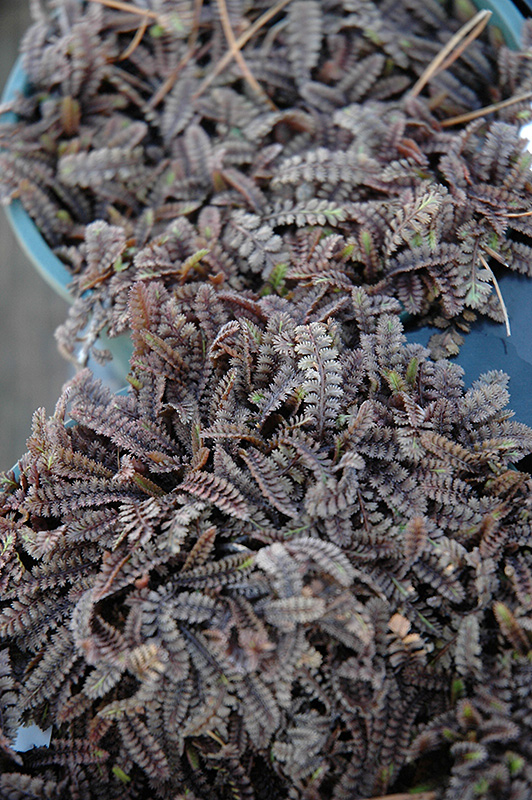Platt's Black Brass Buttons Leptinella squalida 'Platt's Black' Plant Height: 1 inch Flower Height: 2 inches Spacing: 6 inches
Sunlight:
Hardiness Zone: 4 Description: This is a cultivar in which the unusual nearly black foliage is the real attraction; delicate fern-like leaves will tolerate some foot traffic; neither flowers or fruit are particularly ornamental; great as a color accent in a rock garden Ornamental Features Platt's Black Brass Buttons's attractive tiny ferny compound leaves emerge grayish green in spring, turning black in color throughout the season on a plant with a spreading habit of growth. It features subtle gold flowers held atop the stems in early summer. Landscape Attributes Platt's Black Brass Buttons is a dense herbaceous perennial with a ground-hugging habit of growth. It brings an extremely fine and delicate texture to the garden composition and should be used to full effect. This is a relatively low maintenance plant, and can be pruned at anytime. Deer don't particularly care for this plant and will usually leave it alone in favor of tastier treats. It has no significant negative characteristics. Platt's Black Brass Buttons is recommended for the following landscape applications; Planting & Growing Platt's Black Brass Buttons will grow to be only 1 inch tall at maturity extending to 2 inches tall with the flowers, with a spread of 8 inches. When grown in masses or used as a bedding plant, individual plants should be spaced approximately 6 inches apart. Its foliage tends to remain low and dense right to the ground. It grows at a medium rate, and under ideal conditions can be expected to live for approximately 8 years. As an herbaceous perennial, this plant will usually die back to the crown each winter, and will regrow from the base each spring. Be careful not to disturb the crown in late winter when it may not be readily seen! This plant does best in full sun to partial shade. It prefers dry to average moisture levels with very well-drained soil, and will often die in standing water. It is not particular as to soil type, but has a definite preference for acidic soils. It is highly tolerant of urban pollution and will even thrive in inner city environments. This is a selected variety of a species not originally from North America. It can be propagated by division; however, as a cultivated variety, be aware that it may be subject to certain restrictions or prohibitions on propagation.![]()
![]()
![]()
![]()
![]()
![]()
![]()
![]()
![]()
![]()
![]()
![]()
![]()
![]()
![]()
Plant Finder
Characteristics
Applications
Features & Attributes

